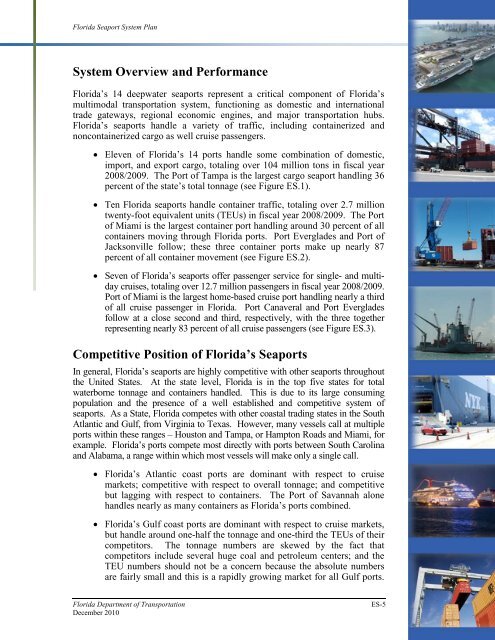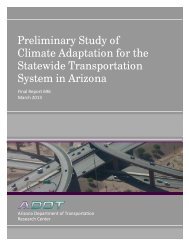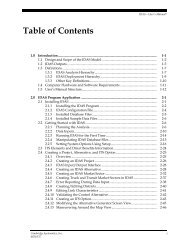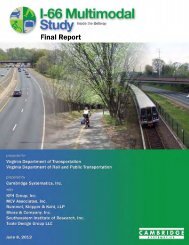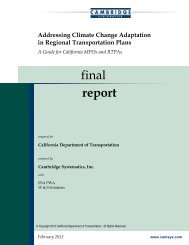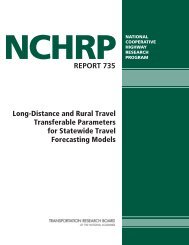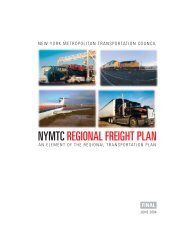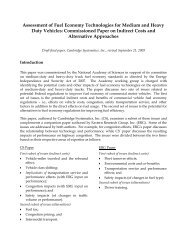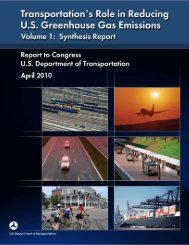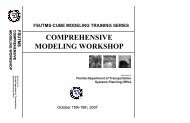Florida Seaport System Plan - SeaCIP
Florida Seaport System Plan - SeaCIP
Florida Seaport System Plan - SeaCIP
You also want an ePaper? Increase the reach of your titles
YUMPU automatically turns print PDFs into web optimized ePapers that Google loves.
<strong>Florida</strong> <strong>Seaport</strong> <strong>System</strong> <strong>Plan</strong><br />
<strong>System</strong> Overview and Performance<br />
<strong>Florida</strong>’s 14 deepwater seaports represent a critical component of <strong>Florida</strong>’s<br />
multimodal transportation system, functioning as domestic and international<br />
trade gateways, regional economic engines, and major transportation hubs.<br />
<strong>Florida</strong>’s seaports handle a variety of traffic, including containerized and<br />
noncontainerized cargo as well cruise passengers.<br />
• Eleven of <strong>Florida</strong>’s 14 ports handle some combination of domestic,<br />
import, and export cargo, totaling over 104 million tons in fiscal year<br />
2008/2009. The Port of Tampa is the largest cargo seaport handling 36<br />
percent of the state’s total tonnage (see Figure ES.1).<br />
• Ten <strong>Florida</strong> seaports handle container traffic, totaling over 2.7 million<br />
twenty-foot equivalent units (TEUs) in fiscal year 2008/2009. The Port<br />
of Miami is the largest container port handling around 30 percent of all<br />
containers moving through <strong>Florida</strong> ports. Port Everglades and Port of<br />
Jacksonville follow; these three container ports make up nearly 87<br />
percent of all container movement (see Figure ES.2).<br />
• Seven of <strong>Florida</strong>’s seaports offer passenger service for single- and multiday<br />
cruises, totaling over 12.7 million passengers in fiscal year 2008/2009.<br />
Port of Miami is the largest home-based cruise port handling nearly a third<br />
of all cruise passenger in <strong>Florida</strong>. Port Canaveral and Port Everglades<br />
follow at a close second and third, respectively, with the three together<br />
representing nearly 83 percent of all cruise passengers (see Figure ES.3).<br />
Competitive Position of <strong>Florida</strong>’s <strong>Seaport</strong>s<br />
In general, <strong>Florida</strong>’s seaports are highly competitive with other seaports throughout<br />
the United States. At the state level, <strong>Florida</strong> is in the top five states for total<br />
waterborne tonnage and containers handled. This is due to its large consuming<br />
population and the presence of a well established and competitive system of<br />
seaports. As a State, <strong>Florida</strong> competes with other coastal trading states in the South<br />
Atlantic and Gulf, from Virginia to Texas. However, many vessels call at multiple<br />
ports within these ranges – Houston and Tampa, or Hampton Roads and Miami, for<br />
example. <strong>Florida</strong>’s ports compete most directly with ports between South Carolina<br />
and Alabama, a range within which most vessels will make only a single call.<br />
• <strong>Florida</strong>’s Atlantic coast ports are dominant with respect to cruise<br />
markets; competitive with respect to overall tonnage; and competitive<br />
but lagging with respect to containers. The Port of Savannah alone<br />
handles nearly as many containers as <strong>Florida</strong>’s ports combined.<br />
• <strong>Florida</strong>’s Gulf coast ports are dominant with respect to cruise markets,<br />
but handle around one-half the tonnage and one-third the TEUs of their<br />
competitors. The tonnage numbers are skewed by the fact that<br />
competitors include several huge coal and petroleum centers; and the<br />
TEU numbers should not be a concern because the absolute numbers<br />
are fairly small and this is a rapidly growing market for all Gulf ports.<br />
<strong>Florida</strong> Department of Transportation<br />
December 2010<br />
ES-5


